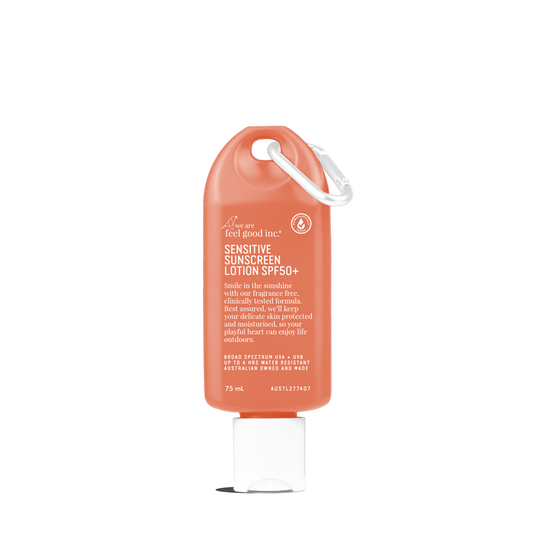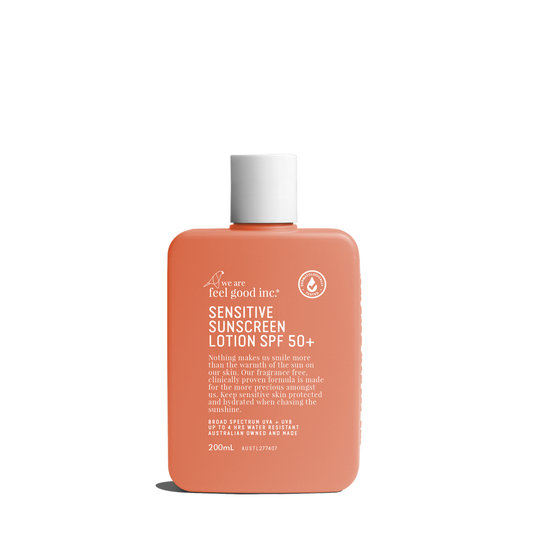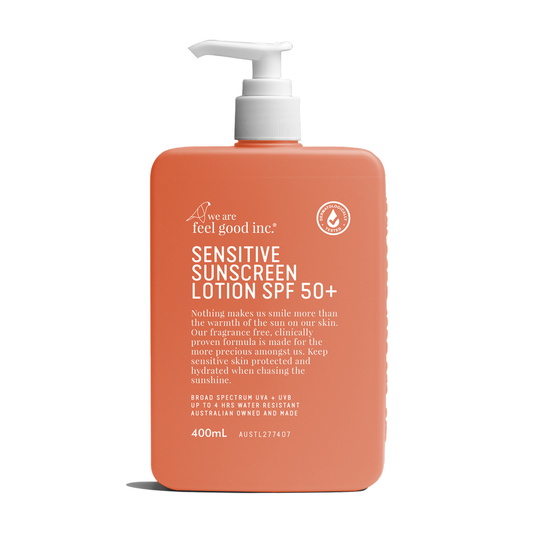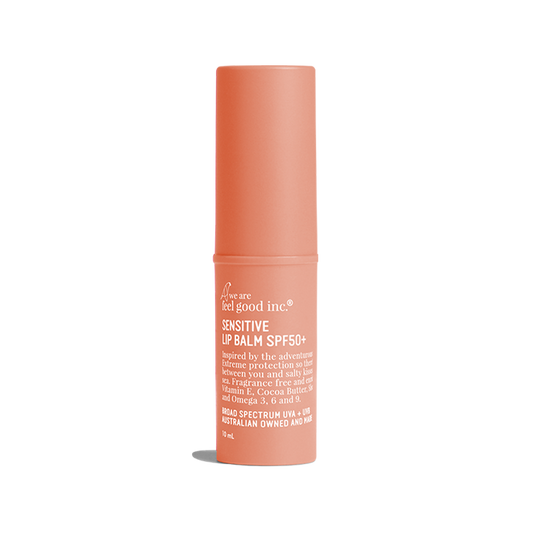Collection: Sunscreen for Sensitive Skin
Read moreCollection: Sunscreen for Sensitive Skin
Read more-
Sensitive Sunscreen SPF 50+ (75mL Traveller)
Rated 4.9 out of 5 stars442 ReviewsRegular price $19.95 AUDRegular priceUnit price per -
Sensitive Sunscreen SPF 50+ (200mL)
Rated 4.9 out of 5 stars442 ReviewsRegular price $32.95 AUDRegular priceUnit price per -
Sensitive Sunscreen SPF 50+ (400mL)
Rated 4.9 out of 5 stars442 ReviewsRegular price $49.95 AUDRegular priceUnit price per -
Sensitive Lip Balm SPF 50+ (10mL)
Rated 4.9 out of 5 stars51 ReviewsRegular price $19.95 AUDRegular priceUnit price per
Is physical (mineral) sunscreen better for sensitivity?
It is difficult to say with full confidence… This varies between individuals. After all it’s hard to say exactly what causes reactions or how you can soothe sensitive skin.
Physical sunscreen can be a good option for sensitive skin due to its gentle and non-irritating nature. Mineral SPF, also known as physical sunscreens, contain active ingredients such as zinc oxide and/or titanium dioxide, which work by sitting on top of the skin and work in a combination of ways. While absorbing most rays before turning them into heat, physical sunscreens also work by reflecting UV rays away from the skin. This is contrary to chemical sunscreens, where they work purely in absorbing the sun’s rays. Nonetheless, the physical barrier in the sunscreen can be less likely to cause skin irritation or allergies, making this kind of sunscreen potentially suitable for those with difficult skin.
However, it's important to note that everyone's skin is different, and some individuals with sensitive skin may still experience irritation or allergies from certain zinc or titanium sunscreens, as sensitivity can vary from person to person. It's always a good idea to patch test a new sunscreen on a small area of skin before applying it all over your face or body, and consult with a dermatologist or healthcare provider if you have any concerns or questions about sunscreen or your specific skin.
Is chemical sunscreen bad for sensitive skin?
Chemical sunscreens can be suitable for all skin, but they may not be the best option for everyone. Chemical sunscreens work by absorbing UV rays and converting them into heat, which is then released from the skin. They typically contain organic (carbon-based) compounds such as their actives.
While most people can use chemical sunscreens without any issues, some individuals with easily irritated skin may experience skin irritation or allergies due to the ingredients in chemical sunscreens. Some common side effects of chemical sunscreens can include redness, stinging, itching, and rash.
If you have sensitive skin, it's important to be mindful of the ingredients in the sunscreen you choose. Some chemical sunscreen ingredients, such as oxybenzone, have been associated with a higher risk of skin irritation and allergic reactions in certain individuals. In such cases, it may be best to avoid sunscreens that contain those specific ingredients. Our Sensitive Sunscreen SPF 50+ does not contain oxybenzone or octinoxate. It is dermatologically tested, clinically proven and fragrance free.!
What type of sunscreen is best for sensitive skin?
This will vary between individuals and personal preferences as every skin type reacts differently.
However, our Sensitive Sunscreen SPF 50+ is a chemical sunscreen specifically developed with the most delicate skin in mind. As a proud partner with the Eczema Association Australasia we have tried and tested our formula for the harshest Australian sun to ensure you are protected white maintaining a healthy skin barrier. Our sunscreen for sensitive skin is clinically proven, lightweight and fragrance free.
Is SPF 50 bad for sensitive skin?
SPF 50, like other SPF levels, is not inherently bad for skin sensitivity. SPF measures the level of protection a sunscreen provides against UVB rays, which are responsible for burning. Higher SPF numbers indicate increased protection against UVB rays. However, it's important to note that SPF only measures protection against UVB rays and does not necessarily indicate protection against UVA rays, which can also contribute to skin aging and other forms of skin damage.
Only sunscreens that are broad spectrum are measured against UVA & UVB rays. All of We Are Feel Good Inc.’s sunscreen for sensitive skin is broad spectrum and SPF 50+ ensuring the highest protection possible.
What to avoid in sunscreen for sensitive skin?
If you have sensitive skin, it's important to be cautious about the ingredients in sunscreens and look for products that are developed to be gentle on the skin. Here are some common ingredients that individuals may want to avoid in sunscreens:
Fragrances: Fragrances are known allergens and can potentially cause skin irritation, especially for those with sensitive skin. Look for sunscreens that are labeled "fragrance-free" or "unscented" to minimize the risk of skin reactions.
Preservatives: Certain preservatives, such as parabens, phthalates, and formaldehyde-releasing preservatives, can potentially cause skin irritation in some individuals. Look for sunscreens that are labeled "paraben-free," "phthalate-free," and "formaldehyde-free" if you have problematic skin.
PABA (Para-aminobenzoic acid): PABA is a UV filter that has been associated with skin allergies and irritation in some individuals. It is less commonly used in sunscreens nowadays, but it's still worth checking the ingredient list for its presence.
Alcohol: Some sunscreens contain alcohol, which can be drying and potentially irritating to your skin. Look for sunscreens that are alcohol-free or developed with low levels of alcohol if you have sensitive or dry skin.



